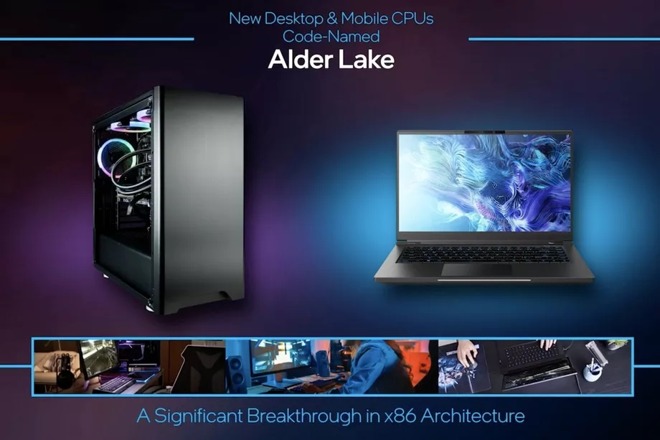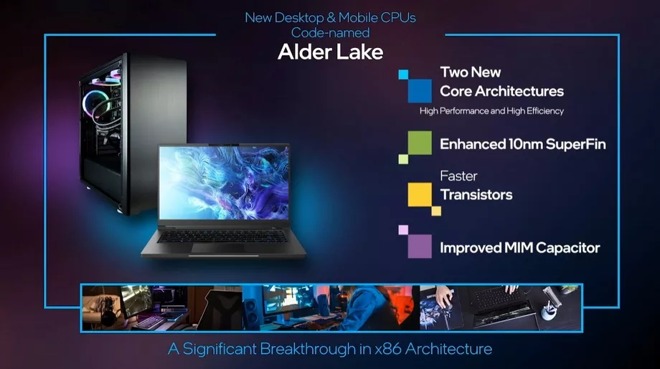Intel 'Alder Lake' chips take same approach as Apple's ARM designs
During CES 2021, Intel showed off its next-generation Alder Lake family of chips, which the company says offers a "significant breakthrough" for the x86 architecture.

Credit: Intel
The hybrid Alder Lake chipsets will use a design similar to Apple's M1 chips, incorporating both high-performance and high-efficiency cores in a single package.
That's similar to the "Lakefield" processors that Intel previewed last year. The Alder Lake family, Intel says, will be the foundation for future desktop and mobile processors.
Intel said that the first computers equipped with this "most power-scalable system-on-chip" would debut in the second half of 2021.

The first computers with Alder Lake chips are set to debut as soon as the second half of 2021. Credit: Intel
The 12th-generation Alder Lake chips will feature an "enhanced version" of the 10-nanometer SuperFin designs that have already shown up in Intel's Tiger Lake family. Alder Lake chips will also feature a combination of high-power "Golden Lake" cores and new "Gracemont" power-efficiency cores.
Unlike Intel's past forays into hybrid chips, the company has plans for the Alder Lake family that stretch beyond mobile devices. The move suggests that Intel is taking inspiration from Apple's own silicon success with ARM-based chips.
The announcement comes amid increasing pressure on Intel to explore strategic options in the face of losing its supremacy in the silicon industry.
It isn't clear at this point how many more Macs will use Intel chips going forward. The last time Apple released a macOS device with an Intel chip was the 2020 iMac lineup in August.
The transition to Apple Silicon, which Apple says will take about two years, is already underway. In 2020, Apple released a new Mac mini, MacBook Pro, and MacBook Air devices with proprietary chipsets. In June 2020, however, Apple made mention that it has "some new Intel-based Macs in the pipeline" that have yet to see a release.

Credit: Intel
The hybrid Alder Lake chipsets will use a design similar to Apple's M1 chips, incorporating both high-performance and high-efficiency cores in a single package.
That's similar to the "Lakefield" processors that Intel previewed last year. The Alder Lake family, Intel says, will be the foundation for future desktop and mobile processors.
Intel said that the first computers equipped with this "most power-scalable system-on-chip" would debut in the second half of 2021.

The first computers with Alder Lake chips are set to debut as soon as the second half of 2021. Credit: Intel
The 12th-generation Alder Lake chips will feature an "enhanced version" of the 10-nanometer SuperFin designs that have already shown up in Intel's Tiger Lake family. Alder Lake chips will also feature a combination of high-power "Golden Lake" cores and new "Gracemont" power-efficiency cores.
Unlike Intel's past forays into hybrid chips, the company has plans for the Alder Lake family that stretch beyond mobile devices. The move suggests that Intel is taking inspiration from Apple's own silicon success with ARM-based chips.
The announcement comes amid increasing pressure on Intel to explore strategic options in the face of losing its supremacy in the silicon industry.
It isn't clear at this point how many more Macs will use Intel chips going forward. The last time Apple released a macOS device with an Intel chip was the 2020 iMac lineup in August.
The transition to Apple Silicon, which Apple says will take about two years, is already underway. In 2020, Apple released a new Mac mini, MacBook Pro, and MacBook Air devices with proprietary chipsets. In June 2020, however, Apple made mention that it has "some new Intel-based Macs in the pipeline" that have yet to see a release.

Comments
This is merely the dying last gasp from a cash cow that became so fat from it’s monopolistic position that it couldn’t move out of its own way.
Now go, you serpent, go tongue kiss and embrace Microsoft goodnight and we’ll all enjoy a double pyrotechnic display unparalleled in the tech world since its Big Bang creation those mere decades ago.
The world will suffer neither of your demises.
If I remember what seems to be one generation apart, is actually comparable.
So intel’s 10nm is like TSMC’s 7nm
Of course TSMC/Apple already being at 5nm, intel is still one generation behind, they should be at 7nm using their processes, rather than at 10nm
IIRC intel stacks things higher, so they can get similar density with a seemingly one-generation behind process, but they also need comparatively wider traces due to the kind of 3D structure, or something like that. There was an in-depth article on that somewhere, of which I only remember fragments. Point being, intel is behind, but not as much as it seems, but they are being held back by a legacy chip architecture.
Eventually they may just have to do a new RISC architecture, but one designed to run a Rosetta-like software layer for x86 emulation particularly efficiently, i.e. quasi exposing microcode as RISC instruction set...
And what exactly is going to kill them? Apple? Not a chance. The commercial/enterprise market buys that majority of Intel's chips. They are not going to switch over to OS X simply because the M1 is superior. They are way too dependent on Microsoft's tightly integrated product offerings to change over to something else for a performance gain that won't make a real impact on productivity or efficiency. Similarly, Apple has no interest in entering the data center market. Intel's market is pretty safe.
Apple has the best chip design team on the planet. And that won’t change.
them out just yet. Time is on Intel’s side. Whether they squander it or not is up to them.
isn’t it just offering a chip with some high performance cores and some low performance cores? That will help battery performance I would think, but not do much for outright performance, if not in fact detrimental at multicore.
They’ve already got high-power cores, they need high-performance cores.
In the voice-over, Forrest says "Bubba knew everything there is to know about the shrimp business". Cut-to Bubba saying "I know everything there is to know about the shrimp business"!
These were probably the Intel-based iMac Pros which were released after the Apple silicon announcement. They received a minor processor bump, so nothing groundbreaking.